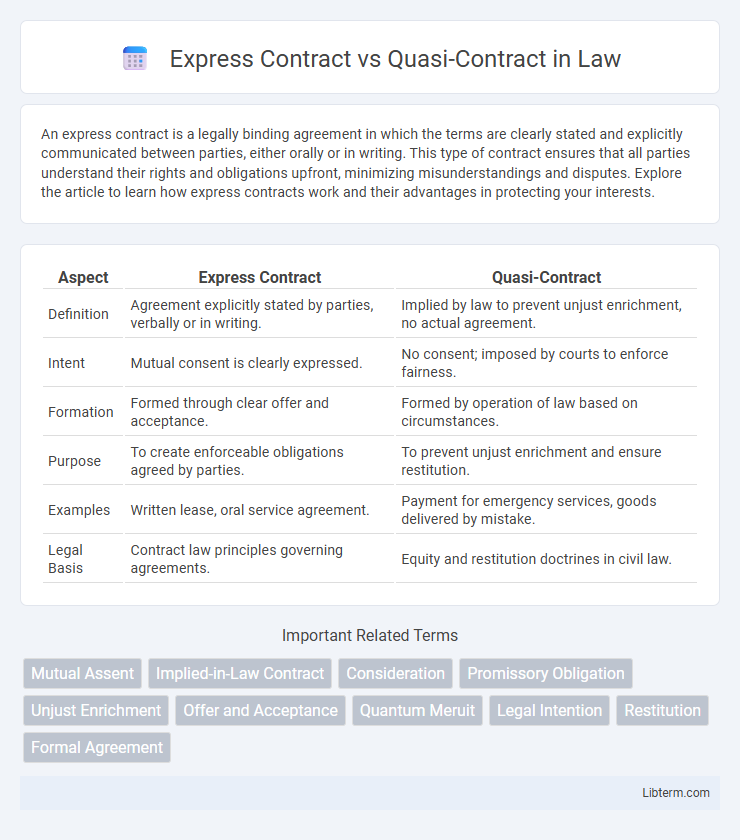An express contract is a legally binding agreement in which the terms are clearly stated and explicitly communicated between parties, either orally or in writing. This type of contract ensures that all parties understand their rights and obligations upfront, minimizing misunderstandings and disputes. Explore the article to learn how express contracts work and their advantages in protecting your interests.
Table of Comparison
| Aspect | Express Contract | Quasi-Contract |
|---|---|---|
| Definition | Agreement explicitly stated by parties, verbally or in writing. | Implied by law to prevent unjust enrichment, no actual agreement. |
| Intent | Mutual consent is clearly expressed. | No consent; imposed by courts to enforce fairness. |
| Formation | Formed through clear offer and acceptance. | Formed by operation of law based on circumstances. |
| Purpose | To create enforceable obligations agreed by parties. | To prevent unjust enrichment and ensure restitution. |
| Examples | Written lease, oral service agreement. | Payment for emergency services, goods delivered by mistake. |
| Legal Basis | Contract law principles governing agreements. | Equity and restitution doctrines in civil law. |
Introduction to Express Contracts and Quasi-Contracts
Express contracts explicitly state the terms and conditions agreed upon by the parties, whether orally or in writing, ensuring clear mutual consent and legal enforceability. Quasi-contracts, also known as implied-in-law contracts, are not based on actual agreements but are imposed by courts to prevent unjust enrichment when one party benefits at another's expense. Understanding these fundamental distinctions helps clarify how obligations arise either through explicit consent or equitable principles in contract law.
Definition of Express Contracts
Express contracts are agreements in which the terms are clearly stated and explicitly communicated by the parties, either orally or in writing, at the time of formation. These contracts distinctly outline the rights, duties, and obligations agreed upon, leaving little room for ambiguity or interpretation. The clarity in express contracts contrasts with quasi-contracts, which are implied by law to prevent unjust enrichment in the absence of a formal agreement.
Definition of Quasi-Contracts
Quasi-contracts, also known as implied-in-law contracts, are legal constructs created by courts to prevent unjust enrichment when no explicit agreement exists between parties. Unlike express contracts formed by clear, mutual consent, quasi-contracts impose obligations based on fairness and equity to ensure one party does not benefit unfairly at another's expense. These obligations arise automatically under legal principles to restore balance and enforce restitution even without a formal contract.
Key Elements of Express Contracts
Express contracts require a clear offer and acceptance between parties, demonstrating mutual consent through explicit terms, either written or oral. Consideration must be present, ensuring that each party provides something of value to support the contract's enforceability. Specificity in obligations and intentions distinguishes express contracts, making the parties' duties and rights unequivocally defined and legally binding.
Key Elements of Quasi-Contracts
Quasi-contracts arise from the principle of equity to prevent unjust enrichment when no formal agreement exists between parties. Key elements of quasi-contracts include the presence of a benefit conferred by one party, the retention of that benefit by another party without compensation, and an obligation imposed by law to provide restitution. Unlike express contracts, quasi-contracts do not require mutual consent or a meeting of the minds but are enforced by courts to uphold fairness.
Legal Basis: Statutory vs. Equitable Origins
Express contracts are founded on clear, statutory legal principles where parties voluntarily agree to specific terms, creating enforceable obligations under contract law. Quasi-contracts originate from equitable doctrines designed to prevent unjust enrichment, imposing obligations regardless of mutual consent to uphold fairness. The distinction hinges on express mutual assent for express contracts versus judicial imposition based on equitable considerations in quasi-contracts.
Major Differences between Express and Quasi-Contracts
Express contracts are agreements in which the terms are explicitly stated and mutually agreed upon by the parties, either orally or in writing, while quasi-contracts arise by law to prevent unjust enrichment when no formal agreement exists. Express contracts require clear consent and intention to create legal obligations, whereas quasi-contracts are imposed by courts to enforce fairness based on the circumstances. The major difference lies in express contracts being voluntary agreements, as opposed to quasi-contracts being legal constructs imposed without explicit consent to remedy a party's benefit at another's expense.
Examples Illustrating Express Contracts
Express contracts are clearly stated agreements in which all terms and conditions are explicitly communicated between parties, such as a written lease agreement for renting an apartment or a signed employment contract detailing job responsibilities and salary. Unlike quasi-contracts, which are implied by law to prevent unjust enrichment, express contracts rely on mutual consent and documented promises, for example, a signed purchase order between a supplier and retailer. Courts enforce express contracts based on the explicit terms established by the involved parties, emphasizing the importance of clear communication and consent in contractual relationships.
Examples Illustrating Quasi-Contracts
Quasi-contracts arise in situations where no formal agreement exists, yet the law imposes obligations to prevent unjust enrichment, such as when a person receives emergency medical treatment without consent and is later required to pay. Another example includes a contractor mistakenly improving a neighbor's property, obligating the neighbor to compensate for the benefits received under quantum meruit. Courts enforce quasi-contracts to provide equitable restitution in cases where one party unfairly benefits at the expense of another despite the absence of explicit contractual terms.
Practical Implications and Legal Significance
Express contracts, formed through clear, explicit agreement between parties, provide definitive terms that facilitate enforceability and reduce ambiguities in business transactions. Quasi-contracts, imposed by courts to prevent unjust enrichment when no formal agreement exists, ensure equitable remedies but lack the mutual consent foundational to express contracts. Understanding these distinctions aids practitioners in selecting appropriate legal frameworks for dispute resolution and contract enforcement.
Express Contract Infographic

 libterm.com
libterm.com